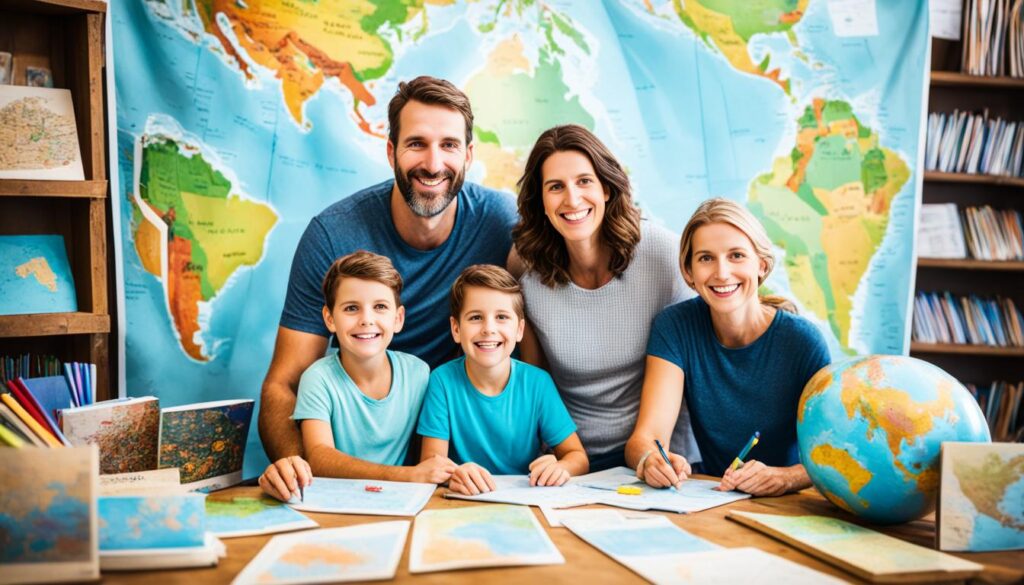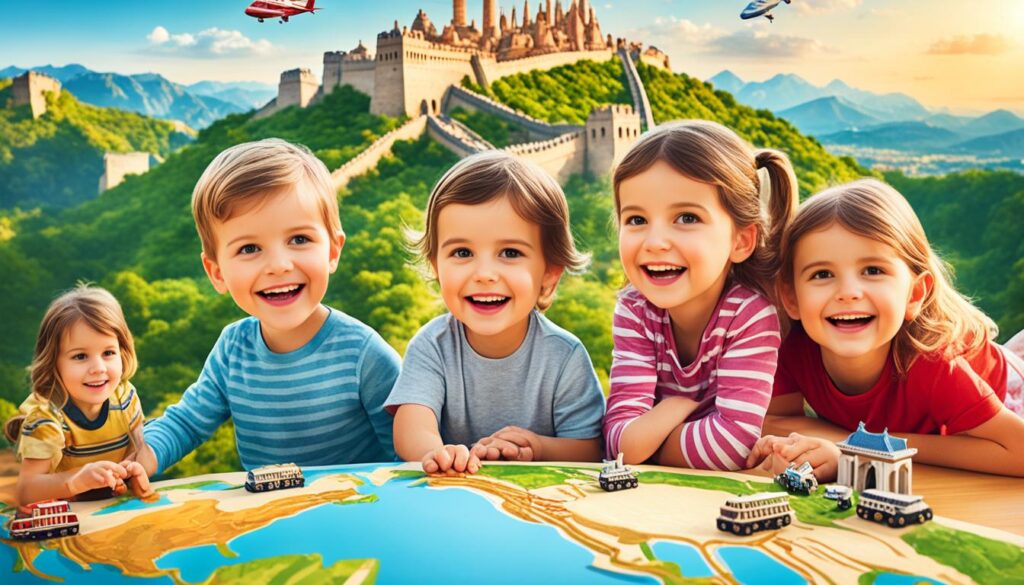Imagine a life where the world is your classroom, filled with adventure and discovery every day. This is the life of family nomads. They’re changing how we think about education and parenting. They ask, What benefits come from living a life of constant exploration and worldschooling?
Key Takeaways
- Families embark on a global adventure, using the world as their classroom
- Worldschooling enables children to develop cultural intelligence and global citizenship
- Digital nomad parents balance work and family life, leveraging remote work opportunities
- Nomadic families challenge societal norms and embrace the allure of continuous discovery
- The journey of family nomads offers profound personal growth and transformation
Embracing the Journey: Our Life as Nomadic Families
As family travelers and supporters of worldschooling, we’ve chosen a life full of discovery. We’ve left behind traditional ways to explore and learn. This choice has changed how we see the world and grow as individuals.
Breaking Free from Societal Norms
Deciding to be nomadic families was a big step. We had to question the usual ways and move beyond what society expects. By challenging these norms, we’ve opened up a world full of new possibilities.
The Allure of Continuous Discovery
Our love for family travel has brought us endless wonder and curiosity. Every place we visit offers new chances to learn, experience different cultures, and appreciate our world’s beauty. This constant learning keeps us growing and brings us closer together.
On our worldschooling journey, we’ve learned that the best parts aren’t just the places we visit. It’s the experiences that change how we see things and make our lives richer. It shows how powerful it is to explore and learn from the unknown.
Worldschooling: A Unique Educational Approach

In the world of nomadic families, education changes with worldschooling. This method uses the world as a classroom. It lets kids learn by doing, going beyond traditional school.
Worldschooling lets kids see different cultures and languages as we travel. It helps them understand and value the diversity of our world. This way, they get ready to live in a connected world.
Worldschooling gives kids more than just knowledge. They learn to adapt, solve problems, and understand different cultures. These skills help them face new situations and see the world from different views.
| Key Benefits of Worldschooling | Outcomes |
|---|---|
| Hands-on, Experiential Learning | Deeper understanding of diverse cultures, languages, and perspectives |
| Cultivation of Global Mindset | Adaptability, problem-solving skills, and cultural intelligence |
| Immersive Cultural Exposure | Nuanced understanding of the world, transcending initial worldviews |
On this journey, we’re not just learning facts. We’re making global citizens ready for our complex world. Worldschooling is more than a way to teach. It’s a path to empower the next leaders, innovators, and change-makers.
Fostering Global Citizens: Developing Cultural Intelligence

We’re on a journey to make our kids global citizens. By exposing them to different cultures, we’re teaching them cultural intelligence. This skill helps them understand and connect with the world.
Embracing Diversity and Understanding
Worldschooling is more than just school. It’s a way for our kids to learn by doing, seeing, and feeling. They get to experience the world’s diversity firsthand.
Through real-life experiences, they’re learning to see things from other people’s viewpoints. This helps them connect with others and understand their stories.
Being able to get along with people from different backgrounds is key to cultural intelligence. Our kids are learning to do this by living it every day. They’re making friends and building bridges across cultures.
This way of learning makes our kids ready for the world. They know how to value and respect different cultures. They’re set to make a difference globally, helping create a more united world.
By choosing worldschooling, we’re raising future leaders and thinkers. We’re giving them the tools to handle today’s complex world. With cultural intelligence, they’re ready to face challenges with empathy and a global view.
Digital Nomad Parents: Balancing Work and Family Life
As digital nomad parents, we’ve found a way to work remotely that fits our family’s lifestyle. This lets us see the world while keeping our jobs. But, it’s not easy to balance work and family life on the move.
Remote Work Opportunities and Challenges
Working from anywhere has given us new chances. We let our kids experience different cultures and ways of life. This helps them grow with a global view.
But, it’s hard to stay productive and focused in new places all the time. We’ve learned to set routines, make clear rules, and fit family time into our work days. This helps us keep everything in balance.
Even with the challenges, the benefits of this life are huge. We get to make memories with our kids as we travel. This lifestyle teaches them to be adaptable and open-minded. These are skills they’ll use for the rest of their lives.